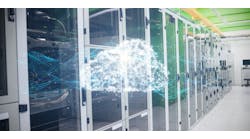Remaking Industry Podcast: Winning the Tech Wars & Capitalizing on the Growth of Hybrid Cloud Environments
Click the graphic to listen to the full podcast, which is transcribed below.
Chris McNamara, Smart Industry editor in chief: Welcome to the Smart Industry podcast, "Remaking Industry" where we dive deep into the tools, techniques and technologies that are accelerating digital transformation.
All right, hi. My name is Chris McNamara, Editor in Chief with Smart Industry. Today we're looking at interesting stuff, tech wars and hyperscalers and we're looking at kinda changes in the approach to cloud computing. This is predicated on recent earnings announcements from big players in the cloud space, Microsoft, Google, Amazon announcing huge gains. Simultaneously, a recent survey of Software AG indicated that about 64% of businesses are using hybrid integration to bring the best out of the public and private cloud. I know that's a common concept for a lot of us but there's probably a lot of gaps in our knowledge about what we're doing in that respect.
So today we're gonna connect with Sanjay Brahmawar, Chief Executive Officer and Chairman of the Software AG management board. He is with Software AG. We're gonna touch on that survey they did and we're gonna talk about hybrid cloud environments, winning the tech wars and partnering with hyperscalers. Sanjay, how are you?
Sanjay Brahmawar, Software AG CEO: I'm doing very well, Chris. And thanks for having me.
Chris: Yeah. Thanks for joining us here. This is interesting stuff. I'm excited to dive into it. Before we do that, give me a little bit about who you are and what you do.
Sanjay: Listen, Chris, look, I was born in India. I'm a Belgian and I have been living in Europe for a very long time. I'm currently serving, as you said, as the CEO of Software AG but prior to coming to Software AG, I worked with IBM for 16 years, you know, and, you know, and have been working in the technology space for quite a long time. And my last role was really working on Watson, the internet of things with IBM before I came over to Software AG.
Chris: Okay. Excellent. And real quick, Software AG, what's the focus?
Sanjay: You know, we're a company that is really helping our customers become truly connected enterprise. And today if you think about the world that we live in, we all live in a new...you talked about hybrid but actually most companies have very distributed architectures and their data is in very different places and a lot of it is in siloes. And so, what we are helping companies do is to bring this data and be able to tap into that data. In some ways, our technology sort of grew to help move data around and to be able to make data accessible to the business in a very simple and self-serve way, you know. So that's what we call truly connected enterprise and how companies can become more digital.
Chris: Excellent, yeah. As we all produce more data, it's a good thing we're gaining incredible insights but it makes everything much more complicated. So good stuff. Let's kind of frame the discussion here. How do you define a hybrid cloud environment? What does that mean to you?
Sanjay: Look, I mean, you know, I think we're all used to, you know, terminologies around, you know, cloud and everybody starts thinking about cloud. But what people don't realize is that there are different variations of cloud. So, you know, the old world is where people had everything or organizations had everything, all their applications and database stored on-prem. And now the opportunity, you know, exists to be able to leverage cloud both in the form of a private cloud or a public cloud.
Chris: Right.
Sanjay: So, this combination, this sort of a situation where you can manage workloads...and when I say workloads, I mean, you know, applications or databases, either on-prem, on a private cloud or a public cloud and carry through your organization in that state, that's what we...that's what's called hybrid cloud.
Chris: Okay. And let's talk about what this approach enables, who's most suited for it, who can most benefit from this strategy.
Sanjay: Yeah, look, I mean, I think most organizations are not, you know, greenfield. They all have been in operation for a long period of time and have a situation where, you know, they all have on-prem infrastructure or have started the journey into cloud. And so, you know, this terminology of hybrid is relevant for almost all of those organizations that are on the journey, number one. Number two, also, there is, you know...not everything is relevant to be on public cloud or on private cloud. And so therefore, there is a combination maybe for some reasons like security or for some reasons around latency, etc., that there is a combination that is also essential.
So therefore, I think it is...in the current situation, this cloud, almost relevant to most organizations unless you're just born on the cloud kind of setup and you only started all your operations just on cloud.
Chris: Right. And what's spurring this growth, this increased awareness of this approach or this increased adoption? What is prompting that? And, you know, when I speak with solution providers, oftentimes...I am always interested in gauging how much of a role of an educator they have to play. You know, to what degree do you have to educate audiences about the opportunities available with this approach and what's prompting this increased awareness and adoption?
Sanjay: You know, Chris, I would say I think in some ways the pandemic has been a crazy accelerator, right.
Chris: Well, sure.
Sanjay: It's almost...the pandemic, it's almost like it's been a wakeup call to organizations. If you got to have all your people work remote, be able to access your data, be able to perform the company's operations from a remote location, you've gotta be able to leverage cloud. If you're not able to do that, it's...it becomes a crazy bottleneck and it also creates a lot of, you know...in some ways, you're not competitive enough in the market. So, I think while we were...prior to the pandemic probably there was a lot of work going on in terms of educating the advantages of using cloud, I think the pandemic has been a big accelerator.
The other thing is companies are clearly realizing that, you know, cloud allows them benefits of scalability, agility, being able to develop things in a fast and agile way. So, combining that capability of cloud with their, you know, existing on-prem capabilities is very beneficial for them, for their operations, both in operation efficiency but also in terms of creating innovation and being able to differentiate themselves.
Chris: Yeah. Boy, it's...boy, across the board, you know, obviously, the pandemic was and continues to be a very challenging experience for all of us, and I hate to use the word "silver lining" but it really has, in terms of this world of digital transformation, it really has accelerated adoption of so many of these concepts.
Sanjay: Indeed, indeed.
Chris: Let's talk about that survey, 64% of businesses are using hybrid cloud integration to capitalize on this public, private approach. What does that tell you and do you...would you...if you surveyed people again a year from now, would you find that number to be increasing? What did you learn from that information?
Sanjay: Well, I think the speed at which hybrid integration is growing is phenomenal, you know. And I do, I do think that next year if we do the survey, it will be a much higher percentage. But what we see now is that, you know, these kinda hybrid integration solutions are now commonplace in organizations.
And almost all organizations have to use hybrid integration. Otherwise, you know, data will be in siloes and data in siloes, as we know, doesn't allow any insights and without insights, obviously, businesses cannot drive faster decisions or be able to respond to customers or even offer connected experiences to their customers. So that's kinda sort of why this is being driven. The other thing is it's also the nature of these hybrid integration solutions has changed a lot, Chris. We have moved away from clunky capabilities where you need a lot of implementation support. You know, you have to do massive projects to be able to bring these integration solutions in to something that we call self-serve, you know, integration as a service. So today to be able to use our API management or our hybrid integration or our IoT solutions, it's literally self-serve mode. Customers can just, you know, stop and start consuming. They don't have to sign up to big license agreements. The user interfaces and the abilities are self-learning and self-accessing for the business.
So, this is another thing that has changed and has also accelerated the adoption.
Chris: Yeah. The easier you make it, the quicker it'll be adopted. And let's talk about that note about the growth with providers, Google, Amazon, Microsoft. What does that tell you? You know, is it just...is it as simple as, you know, their growth represents the growth of the larger adoption, awareness or is it telling in another respect?
Sanjay: Well, you know, I think the cloud players or the hyperscalers as we call them, you know...in the hyperscalers you've got to think about...the one thing I would say is you've gotta think about hyperscalers as the western hyperscalers and also the eastern hyperscalers. And I'll talk a little bit about why I mentioned that because on the western side you've got Google, Microsoft and AWS, right. So Azure, AWS and Google. On the other side, on the eastern clouds, you've got Alibaba, Tencent and Baidu also. So, you've got...we've gotta think of them. And then these companies are growing rapidly because of all the topics you just...we have just discussed, right, the accessibility, the scalability, the cost economics, the ease of access and the ability to start fast and upscale or downscale as...based on your consumption, all of those things. And of course, you know, cloud is now coming as very intelligent with so much abilities to build on and develop the tools, etc. So, it also makes the job of the companies much easier.
So, all of these things combined, you know, is leading to the growth that we see that Azure and AWS are demonstrating.
Chris: Right.
Sanjay: But what is very interesting is customers eventually, even if they sign up with the hyperscalers, have to migrate their workloads from their on-prem onto the cloud. And that is a complicated exercise. And why I say that is because today on the on-prem, Chris, they have a spaghetti. It may be a spaghetti but it works, yeah. And now if you take some pieces out of that spaghetti and you move some of them onto cloud or you start using some cloud-based applications like Salesforce, Workday, whatever, you've gotta make sure that through the hybrid situation and as you do the migration, everything works and that's where, you know, someone like Software AG comes in and we help with this migration and we help with the consumption of the cloud capabilities. That's why our partnership with the hyperscalers is very strong because we are helping them and helping customers like Walgreens Boots which is a very big customer of ours, joint customer at Microsoft and we're helping them, you know, transform and shift their workloads from on-prem onto cloud.
Chris: Yeah, I've never heard that analogy before. That's very interesting.
Sanjay: Yeah.
Chris: Let's talk...some of the terminology in your world is that you talk about tech wars. What do you mean by tech wars going on and what's the key to, you know, winning the tech wars?
Sanjay: Well, you know, I've been talking a little bit about this and I call it the digital iron curtain. And the thing is there is this, you know, rise of platforms or let's say cloud platforms from east and west. And where the challenge arises is for organizations that have to operate in a global way. So, if you think about, you know, customers that have China as their...as either their big market or one of their big markets and then of course operating heavily in the US they need to be able to navigate both the eastern and western clouds.
And so, we see this tech war. It's not a war that's going to subside or go away. In fact, it will continue. In some ways, in a healthy way but also in some ways, this creates the kind of challenge for global companies. How do they navigate both this...and I think that creates a great opportunity for a company like us, Software AG, where we are able to offer an independent thin layer that can sit right on top of any cloud. And as we move to the future, you know, my view anyway is that cloud will become just like electricity. It will be an intelligent commodity but it will be a commodity. And therefore, you know, you do need to have the ability to be able to switch and use multiple clouds. And multi-cloud is going to be the norm and therefore, organizations have to avoid that they get locked into only one provider or one cloud [inaudible 00:13:09] keep themselves open, you know.
Chris: Yeah, particularly as operation scales and as enterprises become global. Boy, cloud will become like electricity, what an interesting concept. The ubiquity of it, yeah. Last question for you, Sanjay. Let's talk about the near future of this hybrid cloud tech, public, private approach. What most excite...well, the front end, what's the greatest challenge you see facing us in this respect in the coming year or two and what opportunities there most excite you in the near future?
Sanjay: You know, I think the biggest challenge is actually the change that needs to happen in organizations, Chris, you know. And I think there's too much talk about just technology and there is less understanding that your ways of working have to change. When you shift to cloud, when you adopt and go more digital, your ways of working change. You know, your interactions and the way you manage your operations, a lot of that changes. And I think the biggest challenge is that companies are not focusing enough on that change management and that aspect around their processes and the ways of working. So that I see as a big challenge because just adopting new technology in cloud will not really help companies become truly digital. So that's kinda one thing on the challenge side.
Chris: Yeah.
Sanjay: I think what really excites me is just the immense opportunities that open up for companies that do take the step for digital. I mean, think about it. We have a customer, Eppendorf in Germany, it's the world's leading med tech providing lab testing equipment to...across the globe. And for them to be able to have all their equipment in the field connected to our IT platform, we will collect that data, combine that with their maintenance data, with the customer interaction data and be able to offer a very rich customer experience, very rich, experience like the Apple iPhone experience or the Tesla experience to their customers. That is what really excites me, the fact that this doesn't need to be only an iPhone experience anymore. I mean, one customer asked me a very interesting question. He said, "Sanjay, why is it that the B2C experience cannot be brought into the B2B world? Why is the experience, like, you know, on my iPhone not the same experience I get with enterprise software?"
And that's fantastic, isn't it? That's exactly what it should be. Enterprise software, enterprise engagement using cloud, using these capabilities should be so intuitive and so self-serving just like the way we use our iPhones. And that excites me. That is an awesome opportunity.
Chris: And as particularly younger workforces enter these roles, they're gonna expect that. They're gonna say, you know, "I had the ease of use with my cellphone or the...with the interactive devices I have throughout my home. Why do I have to take a step back when I come into the workplace? That's not gonna suit me."
Sanjay: Absolutely. You know, I mean, to...I think, you know, that the days of going and doing software courses to learn how to use technology, you know, those are gone, you know.
Today's generation is self-learning. They just wanna get on and use it and they will discover their ways around it.
Chris: Amen. I love it. Sanjay Brahmawar with Software AG, thank you for joining us today and sharing your insights. It's very interesting stuff.
Sanjay: I enjoyed the conversation, Chris. Thank you so much for having me.
Chris: Yeah. And to our listeners, as always, we remind everyone to go out and make it a smart day.





